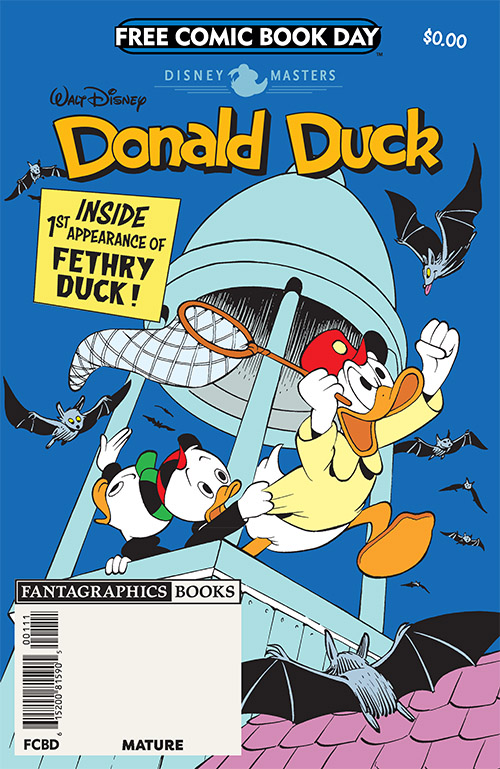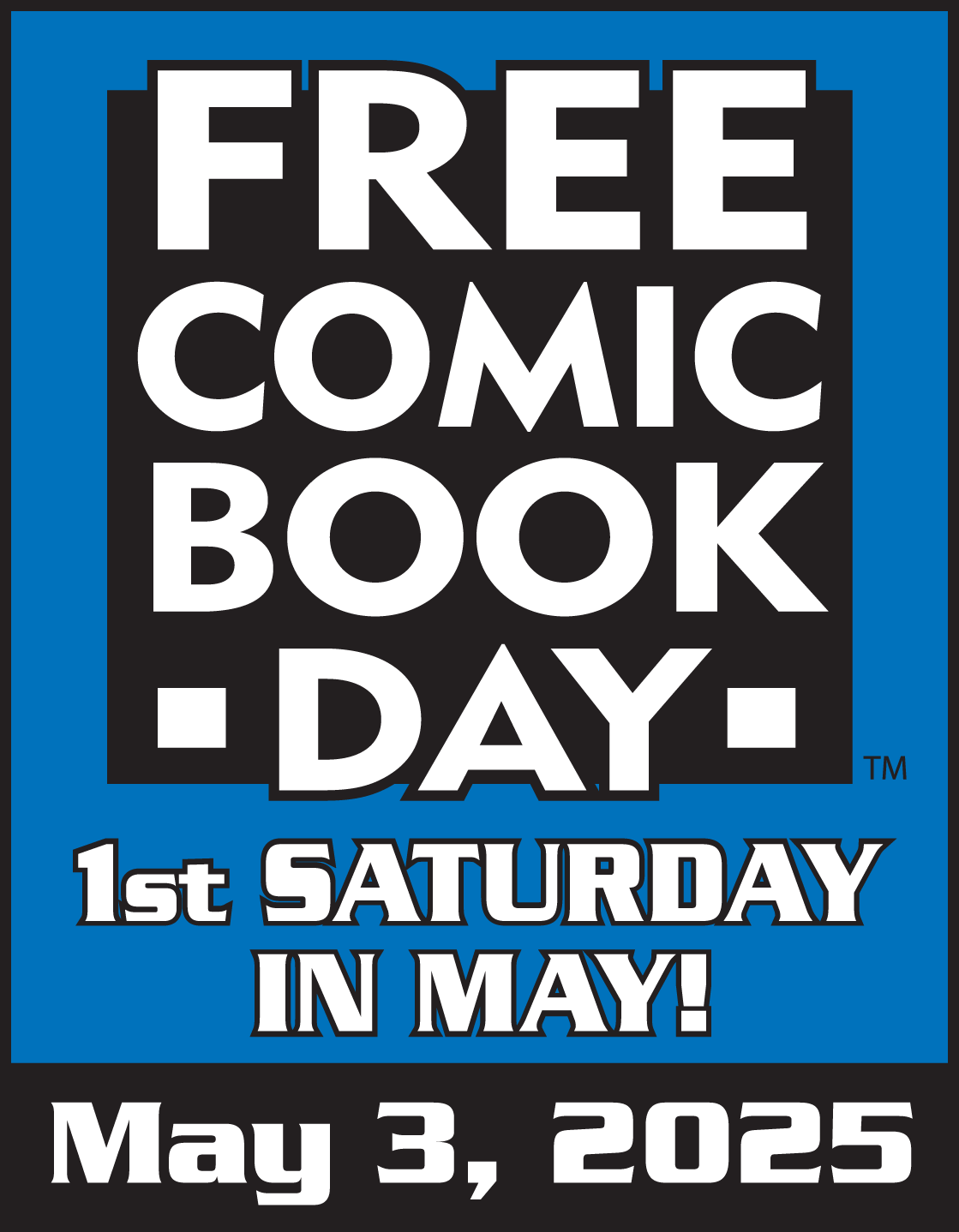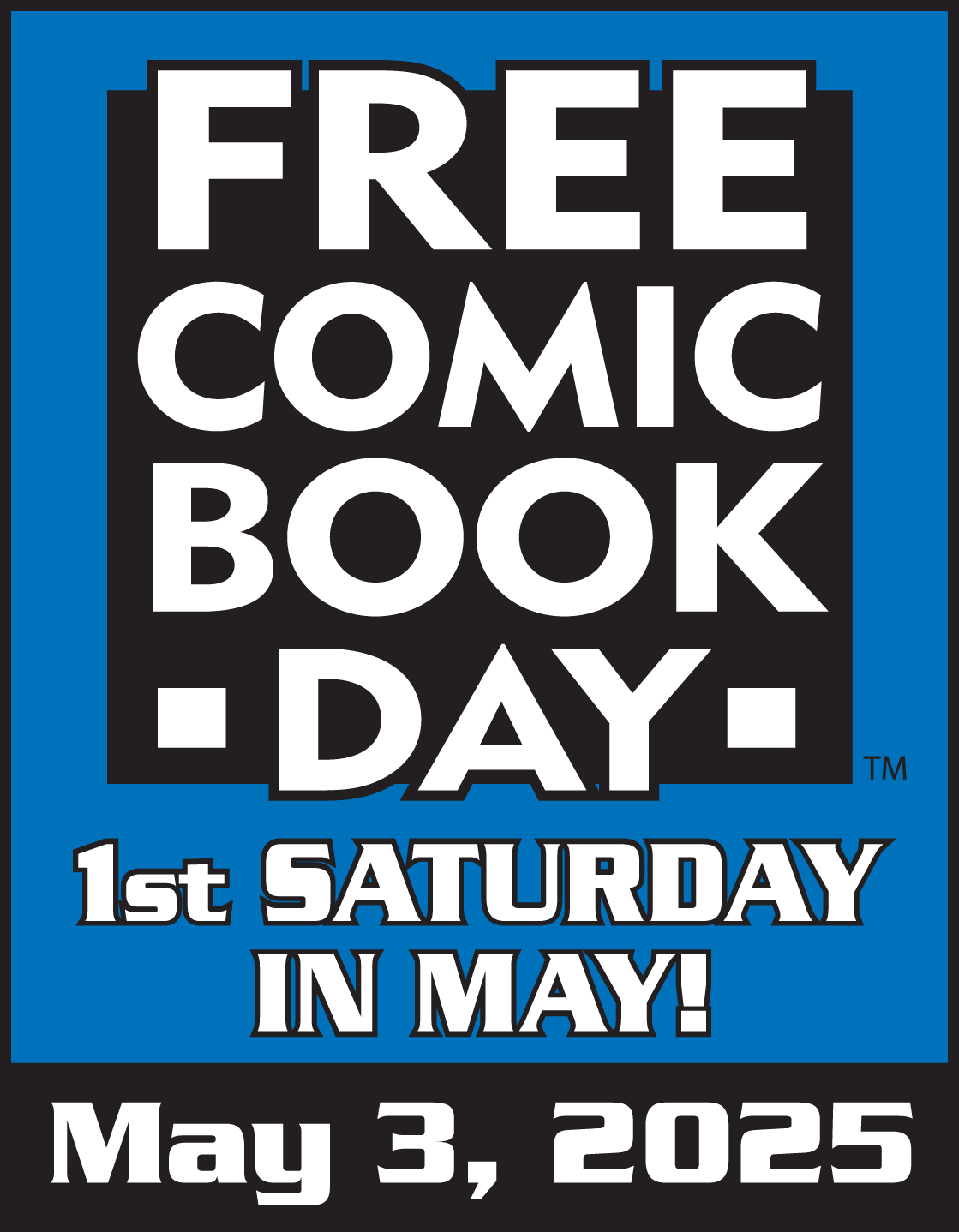FCBD20 Interview: Donald Duck Dazzles with 3 New Outrageous Stories!
Aug 27, 2020
Few, if any, ducks are more iconic than Donald Duck! A ridiculously raspy voice and a plethora of outrageous antics to match, Donald Duck is the posterchild for “What could possibly go wrong?” Yet, he always manages to find a way to fix things and teach kids a lesson or two along the way.
Now, Donald Duck has taken Free Comic Book Day – or should we say Free Comic Book Summer – by storm in this collection of some of his craziest adventures yet! We got a chance to speak to the archival editor at Fantagraphics Books, as well as the creative teams behind each story in this collection, to get the inside scoop on what makes a Donald Duck tale so special!
Disney Masters: Donald Duck Special hit comics shops on August 19 as part of Free Comic Book Summer! If you want to get your hands on a copy of this All-Ages delight, be sure to head to your local comic book shop and ask about their Free Comic Book Summer selection.
Free Comic Book Day (FCBD): Set up your title for those that might be new to your comic book: What will new readers need to know before diving into your Free Comic Book Day issue? Who are the characters, and what’s the storyline? 
David Gerstein (archival editor): Donald Duck wants to show the world he’s an expert at everything and win the life of luxury he’s sure he deserves, but he’s got a temper the size of Greenland, and everybody in town gets in his way. Including his smart-aleck nephews and stingy Uncle Scrooge McDuck.
Fantagraphics’s Disney Masters series presents famous Disney comics stories from around the globe, old and new, but always told in the timeless Walt Disney style. This FCBD sampler brings you classic stories from several talents we’ll be featuring this year and next. In “It’s Bats, Man,” by American writer John Lustig and Canadian artist William Van Horn, Donald becomes a Master of Pest Removal. Then Dutch writer/artist team Evert Geradts and Mau Heymans brings us “Much Ado About Telepathy,” with Uncle Scrooge seeking a mystical animal that can read minds. And then Dick Kinney and Al Hubbard sic “health nut” Cousin Fethry on Donald.
Kinney and Hubbard are no longer with us, but I’ve got Lustig, Van Horn, Geradts, and Heymans with me now to tell all.
FCBD: What are some of the themes of your book and what do you hope readers get out of it?
John Lustig (writer, “It’s Bats, Man!”): Mostly I hope readers will laugh themselves silly. It’s about Donald Duck being a master of pest control —’til the pests fight back.
William Van Horn (artist, “It’s Bats, Man!”): I was inspired to do Duck stories because I grew up on them, literally from Carl Barks’s first story. I always respected the way he made the Ducks seem like real people, so I want readers to catch the same feeling. They’re real people, they just happen to look like ducks.
Evert Geradts (writer, “Much Ado About Telepathy”): The psychological theme is that we do not always say what we really think. I hope readers will weigh the advantages and the disadvantages of this.
Mau Heymans (artist, “Much Ado About Telepathy”): I have quite a cynical vision of society, expressed in “Much Ado About Telepathy” when Scrooge is tempted to use a rare animal’s special talent to help him in his business. I don’t try to put morals into my stories, but I support kindness to animals and hope some readers will enjoy seeing Scrooge get what’s coming to him!
FCBD: What did you enjoy most about writing/drawing this comic? Can you share some of the inspiration behind certain characters/settings/etc.?
John Lustig (writer, “It’s Bats, Man!”): It’s very much inspired by the classic Carl Barks stories where Donald is a master of something ridiculous, but then gets overconfident (or unlucky) and everything descends into hilarious disaster.
William Van Horn (artist, “It’s Bats, Man!”): Donald often wins by losing or loses by winning at the end of a story; but sometimes he loses completely. “It’s Bats, Man” ends in a comic disaster for him, and I literally performed it — acted it out as I drew it — to make sure it worked; to keep the quality of the characters alive.
Evert Geradts (writer, “Much Ado About Telepathy”): I like the acting and the interactions of the characters. To me, scripting comics is a form of theatre, as in Commedia dell’Arte and French boulevard theatre. I think Mau Heymans feels the same way about drawing comics.
Mau Heymans (artist, “Much Ado About Telepathy”): That’s right. But Evert draws too; he makes little drawings as part of the script, as a suggestion for the final art. When I drew the “pufftailed woodseer,” the rare telepathic animal in this story, I’m sure I was highly inspired by Evert’s sketches.
FCBD: What was one of the most surprising things you learned while working on this book?
John Lustig (writer, “It’s Bats, Man!”): That bats and other “pests” can be very funny. I need to do a graphic novel of pest humor!
William Van Horn (artist, “It’s Bats, Man!”): At the time I drew “It’s Bats, Man,” I’d been doing Donald Duck stories for about two years or so. And John Lustig asked me, “Do you think you’ll still be doing the Ducks in five years?” It was really something to think about. I said, “I don’t know.” Of course, if he had suggested I’d be doing them for thirty years, as I ended up doing, I’d have said he was bats!
Evert Geradts (writer, “Much Ado About Telepathy”): I find the whole process of writing and constructing a comics story very surprising. I start with just an idea; and working on it, I lose myself in it, forgetting my surroundings. And then, when the story is finished, I read it as if it were completely new to me.
Mau Heymans (artist, “Much Ado About Telepathy”): As I drew the story of the “pufftailed woodseer,” I realized there was some reality in it. I’m serious — I myself have had quite a few experiences with, if not telepathy, other mind tricks like foreseeing the near future. I’ll be dozing off aboard a train and dream about the conductor coming up the stairs — then thirty seconds later, that exact thing happens!
FCBD: What other comic books would you compare to this title? “If a comics reader likes _______ , they should pick up my title?”
John Lustig (writer, “It’s Bats, Man!”): Pick up any of the Fantagraphics books reprinting Carl Barks’s classic Disney duck stories. There’s a reason why all of us funny animal creators look to Carl for inspiration. He was a genius.
Evert Geradts (writer, “Much Ado About Telepathy”): Ha, that’s an easy one! If a comics reader likes stories by Carl Barks, they should read my stories, too.
Mau Heymans (artist, “Much Ado About Telepathy”): Older readers might think Disney is just for kids, but if they like the crazy, early indie comics of Gilbert Shelton and Paul Mavrides, they’ll like Donald Duck. The quality of comics depends on how many times you can reread them and still enjoy them as if for the first time. That’s true of Shelton, Mavrides, and Carl Barks for me.
FCBD: Looking to the future, is there anything you can tease about what’s coming up for the title and its characters?
David Gerstein (archival editor): In 2020 and 2021, Disney Masters will be bringing you whole volumes dedicated to the Donald Duck works of Dick Kinney and Al Hubbard and William Van Horn (sometimes with John Lustig), but first comes Volume 10, devoted to Mau Heymans and his brother Bas, also a Disney comics artist.
Mau Heymans (artist, “Much Ado About Telepathy”): I hope readers of Disney Masters will sense the enjoyment and passion that I put into making the stories. The nephews and Donald have a place in my heart; which sounds strange for comics characters, but it’s been true since I was 7 years old.
FCBD: What got you into reading comics?
John Lustig (writer, “It’s Bats, Man!”): I can’t remember a time when I wasn’t fascinated by comics. Before I could even read, I was staring at comic strips in newspapers — begging adults to read them to me. And, once I discovered comic books, I wanted those, too — all of them. Other kids saved their money for candy. I saved mine to buy comics.
William Van Horn (artist, “It’s Bats, Man!”): I’d had earlier issues, but what really caught me was Walt Disney’s Comics and Stories #45 in 1944: the Floyd Gottfredson Mickey story “Mickey Mouse on a Secret Mission,” where he has that strange-looking airplane, and he winds up fighting in World War II. I was just hooked on Mickey at that point. It was later that I became more interested in the Ducks.
Evert Geradts (writer, “Much Ado About Telepathy”): My two grandmothers. One subscribed to a weekly package of magazines that circulated from one household to another. This was just after World War II; Europe was very poor and it was a clever way to share expensive reading matter — and the package contained Tintin, a weekly full of comic strips! My other grandmother had a big couch with a secret compartment holding a big stack of comics; she loved reading them, which was rare for an adult in those days.
Mau Heymans (artist, “Much Ado About Telepathy”): Comics were always lying around in my older brother’s room, and the rest is history!
FCBD: Many newcomers will pick up comics for the first time on FCBD — what was the first comic you remember reading?
John Lustig (writer, “It’s Bats, Man!”): The one I remember best was an early Uncle Scrooge-Magica De Spell story, “Ten-Cent Valentine.” Of course, it was written and drawn by the great Carl Barks. Decades later, I got to meet Carl several times and even work with him a bit. That was a real thrill.
William Van Horn (artist, “It’s Bats, Man!”): The first comic book I remember having and reading was Walt Disney’s Comics #25 — November 1942. I always really liked Walt Kelly’s covers on those early issues. When I was about 8, I began tracing them…
Evert Geradts (writer, “Much Ado About Telepathy”): My favorites, hidden in my grandmother’s Aladdin-like couch, were Dutch reprints of Bela Zaboly’s Popeye and Harold Knerr’s Katzenjammer Kids.
Mau Heymans (artist, “Much Ado About Telepathy”): The first comic I read was Hergé’s Tintin — the famous “Blue Lotus” story set in China. I thought it was such an eerie comic — such weird things happened that I’ll never forget it! I was shocked and fascinated at the same time.
FCBD: What are some of the titles you’re reading today?
Evert Geradts (writer, “Much Ado About Telepathy”): I’ll read just about everything I can get my hands on, except superhero and fantasy stories. The last graphic novel I read was a French biography of punk cartoonist Charlie Schlingo. It was very sad, but a perfect example of the power of comics storytelling.
Mau Heymans (artist, “Much Ado About Telepathy”): In the 1990s there was a girls’ comic called Tina; and many talented Spanish comics writers and artists worked on it. The stories were aimed at 10- to 12-year-old girls, but they were so perfect that I love to reread them — and am doing so now.
FCBD: What is your favorite part about working in the comics industry?
John Lustig (writer, “It’s Bats, Man!”): There aren’t many businesses where you get paid for having a sense of humor. Lucky me — I found one! The other thing that I love is the people. Most of the pros I know are fun, smart, creative people. We’re all doing this because we love comics. And many of us are fans of each other’s work.
William Van Horn (artist, “It’s Bats, Man!”): Just the idea that if I could write the stuff and then draw it, I could work freelance from home. I really liked that, especially after the years I spent working in-house at an animation studio in San Francisco.
Evert Geradts (writer, “Much Ado About Telepathy”): Friendship. The artists I know — mainly Dutch and American — are part of a close universe, where everybody is ready to help colleagues and aspiring newcomers. I am not so sure the rest of the world turns the same way.
Mau Heymans (artist, “Much Ado About Telepathy”): I feel totally free, and I need that. I draw my own stories, I can write my own stories; as a freelancer, I can get up late and go to sleep really late — I could never work from 9 to 5! I love what I do.
FCBD: Tell us why everyone should read comic books!
John Lustig (writer, “It’s Bats, Man!”): The most important reason is… if everyone reads comics, I’ll finally get paid what I’m worth — a gazillion dollars. Other than that, I think everyone should read comics because they’re fun.
William Van Horn (artist, “It’s Bats, Man!”): For the same reason I did — for the pure fun of it! I’ve always thought comic books are intrinsically interesting, and once you start to collect them, you don’t want to let them go. You want to read them over and over again!
Evert Geradts (writer, “Much Ado About Telepathy”): Comics are a solid art form, possessed of unique possibilities that don’t come together in any other medium. Comics have dialogue, action, clarity, rhythm, overview, poetry, and magic, and that’s not all. I’m an artist, not an analyst — E viva los comics!
Mau Heymans (artist, “Much Ado About Telepathy”): I compare scripting comics to scripting movies. Both comics and movies rely on viewers’ brains filling in what happens between one scene and the next. Think about it as you read — the process of reading comics fires up your imagination!
FCBD: What is your favorite part about Free Comic Book Day?
John Lustig (writer, “It’s Bats, Man!”): The free comics — duh. And the fact that lots of “civilians” are discovering comics for the first time.
William Van Horn (artist, “It’s Bats, Man!”): It’s nice to see my stuff get around that way — for free. When I was a kid, if there had been a free comic book day, I wouldn’t have believed it!
Evert Geradts (writer, “Much Ado About Telepathy”): It’s a wonderful idea, though we don’t have it in the Netherlands. What we did have — and it changed my life completely — was the nationwide free distribution, in 1952, of the first issue of our Dutch Donald Duck comic book. I still remember reading it as a 9-year-old; it contained Carl Barks’ “Fireman Donald” story, and it sealed my destiny.
Mau Heymans (artist, “Much Ado About Telepathy”): It’s an awesome idea — as Evert says, we don’t have it in the Netherlands. Some book publishers do it here: they make giveaway samples of novels by popular writers. It’s bizarre we don’t have Free Comic Book Day; we should!
Reprint Material
Rating: All-Ages

| Find a participating local comic shop to celebrate Free Comic Book Summer 2020! |



